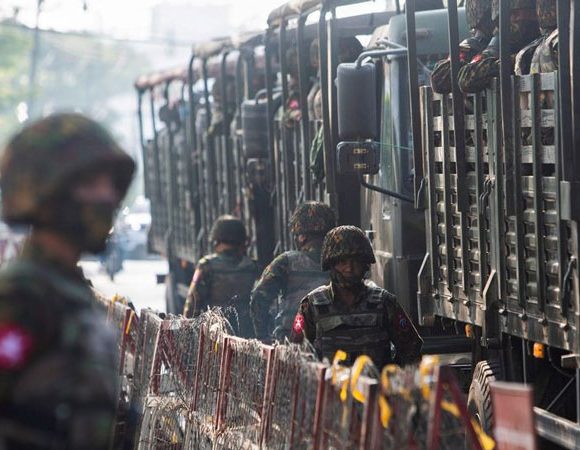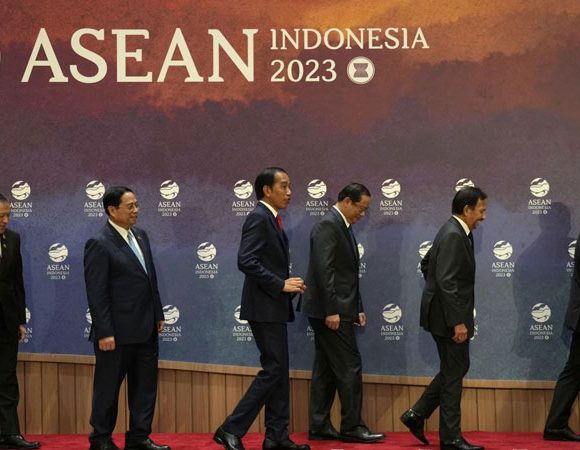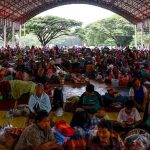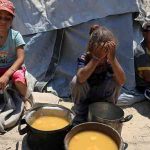As Israel proclaims ‘targeted’ phase of war, Gazans find little change

Israeli soldiers and vehicles move inside Gaza near the border with Israel, amid the ongoing conflict between Israel and the Palestinian Islamist group Hamas, as seen from Israel, January 6, 2024. REUTERS/Amir Cohen TPX IMAGES OF THE DAY
Palestinians see little respite from Israeli bombardment that has shattered Gaza despite Israel’s announcement of a new “more targeted” phase of its war and the top US diplomat’s renewed push for protection of civilians during a visit.
Israeli Defence Minister Yoav Gallant had said on Thursday that the military “will transition to a new combat approach” with a less intensive air campaign, after saying earlier it would start pulling some troops out of the Gaza Strip.
However, families continue to rush into Gaza’s hospitals each morning, carrying relatives injured during overnight bombardment, and finding crammed, sometimes bloodstained wards and corridors. Rescue workers arrive to offload corpses pulled from pancaked buildings.
“Any moving thing is targeted in Palestine, and in Gaza especially,” Shehada Tabash said as he arrived at the European Hospital in Khan Younis after losing his niece and cousin to an air strike.
Health authorities in Hamas-run Gaza said early on Tuesday that 126 people were killed over the previous 24 hours, bringing the toll since Oct. 7 to 23,210, with thousands more bodies feared still lying, uncounted, under the rubble.
US Secretary of State Antony Blinken said there was an “absolute imperative” for Israel to do more to protect civilians before he arrived in Tel Aviv on Tuesday to meet Prime Minister Benjamin Netanyahu, part of a regional tour.
In a meeting with Israeli Prime Minister Benjamin Netanyahu, Blinken “stressed the importance of avoiding further civilian harm and protecting civilian infrastructure in Gaza”, State Department spokesperson Matthew Miller said in a statement.
But for many Gazans, most of whom are now homeless after three months of bombing that has smashed apartment blocks, schools, hospital buildings and even graveyards, those words ring hollow.
“We are being bombed by American(-made) planes, blown up by American weapons so let Blinken stop this nonsense,” said Shaban Abad, 45, an IT specialist from Gaza City who was displaced first to Khan Younis and then to Rafah with his five children.
“Since he arrived in the region the bombing in Gaza, in Rafah, which is supposed to be a safe place, has not stopped. Doesn’t he see it?” Abad added.
Israel’s stated objective is to destroy Hamas, which killed more than 1,200 people, mostly civilians, and seized 240 hostages when its fighters rampaged across the border on Oct 7, triggering the war.
However, while much of the tiny, densely populated coastal enclave has been pummelled to rubble, the Islamist militant group is still fighting and its top leaders remain at large.
Israel’s military, which says Palestinian civilians should not try returning to their homes in the north of Gaza, where it began its offensive in October, has meanwhile expanded its operations in Khan Younis in the south, it said on Tuesday.
‘WE DON’T SEE ANY GLIMMER OF HOPE’
After Israel ordered all civilians to leave northern Gaza, many took refuge in the south, though it continued to shell that area too. Its ground troops have since invaded the south, pushing displaced Palestinians into ever more crowded shanties on the enclave’s southern edge bordering Egypt.
In Khan Younis, 8-year-old Abdel Jaber Mohammed al-Farra said he and his father and younger brother had fled their home with nothing, fired upon by Israeli forces as they sought shelter at the European Hospital.
“We heard the sound of tanks in the street. We ran. We saw forces on foot. We hid behind a wall. The soldier started firing at the wall. We left with nothing,” he said.
The Farra family is joining a huge mass of displaced people unable to return home, entirely reliant on inadequate aid supplies and seeing no end to the war.
At a makeshift camp near the hospital where the Farra family is now looking for shelter, Youssef Salem Hijazi said his family’s house in the north had been destroyed. Even so, they want to go back there to put up a tent in the rubble and start piecing their life back together, he said.
Blinken’s comments urging Israel to ease its offensive and allow civilians to go back home were welcome, Hijazi said. “But we hear his words in vain. We see nothing. We follow the news but see nothing to build any hope on in reality. We don’t see any glimmer of home.”















